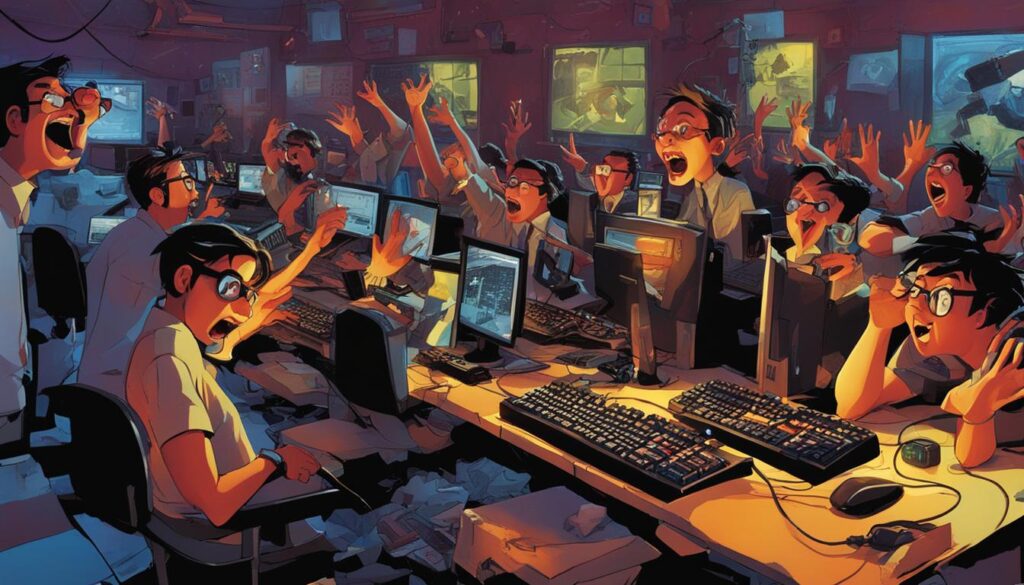Did you know that the term ‘fap’ gained popularity online and is now widely used to refer to masturbation? But have you ever wondered where this slang word actually comes from? In this article, we will explore the origins of ‘fap’ and its evolution in popular culture. Get ready to uncover the surprising story behind this widely recognized term.
The Origins of Fap
The term ‘fap’ originated from a Japanese manga called Heartbroken Angels in 1999. It was used as an onomatopoeic representation of the sound of masturbation. The word ‘fap’ gained popularity on the internet, and by 2002, it was added to Urban Dictionary. It started appearing in webcomics and online forums, eventually becoming a widely recognized term for self-pleasure. The linguistic shift from traditional terms like ‘jacking off’ or ‘masturbating’ to ‘fap’ signifies a change in the way people discuss and perceive the act of masturbation.
Fap in Popular Culture
The term ‘fap’ has become ingrained in popular culture, particularly in manga and webcomics, where it is frequently used to depict male masturbation in a humorous or satirical manner. This usage has contributed to the widespread recognition and acceptance of ‘fap’ as a term for self-pleasure. Moreover, ‘fap’ has also found a prominent place in the adult entertainment industry, where it is often included in website names, video titles, and descriptions to attract a specific audience interested in adult content. Its usage in both mediums demonstrates the cultural significance and influence of ‘fap’ in contemporary society.
Fap in Manga and Webcomics
In manga and webcomics, ‘fap’ is employed as a comedic element to depict male masturbation. It adds a humorous twist to the narrative, often playing with the contrast between the awkwardness or absurdity of the situation and the actual act being portrayed. The use of ‘fap’ as a sound effect in these mediums heightens the comedic effect, making the topic more approachable and relatable to readers and fans.
“The clever incorporation of ‘fap’ in manga and webcomics showcases the playful nature and innovation of these mediums in addressing taboo subjects in a lighthearted and entertaining way.”
Fap in the Adult Entertainment Industry
The term ‘fap’ has also gained significant traction in the adult entertainment industry. Websites and adult-oriented videos often incorporate ‘fap’ in their titles or descriptions to target individuals interested in adult content related to self-pleasure. The use of ‘fap’ in this context aims to create an immediate association with sexual satisfaction and appeal to the specific desires and preferences of the target audience.
| Use of ‘Fap’ in the Adult Entertainment Industry | Impact |
|---|---|
| Website Names | Examples: FapZone, FapChat, Fapulous |
| Video Titles | Examples: “Hot Solo Fapping Session,” “Intense Fapping Experience” |
| Video Descriptions | Examples: “Watch and fap to this steamy video,” “Ultimate fapping pleasure awaits” |
It is important to note that while ‘fap’ is widely used in these specific contexts, the term’s popularity and cultural significance extend beyond the adult entertainment industry, making it a recognizable term for masturbation in general.
The Rise of NoFap
In recent years, the NoFap movement has gained significant traction and a devoted following. The movement promotes a lifestyle of abstaining from masturbation and pornography, aiming to improve relationships and overall well-being.
Despite the negative perception of fapping, the NoFap community believes that refraining from these activities can have numerous benefits. By abstaining from masturbation, individuals claim to experience increased energy, confidence, focus, and motivation to pursue their goals.
Furthermore, the NoFap movement emphasizes the importance of real human connections and the development of healthy intimate relationships. By redirecting sexual energy towards more meaningful interactions, followers of NoFap claim to experience improved social skills, emotional stability, and overall satisfaction in their lives.
The benefits of NoFap extend beyond personal well-being. Many participants of the movement also highlight the positive impact on their sexual relationships. By eliminating the reliance on pornography or self-pleasure, individuals report heightened sensitivity, improved sexual performance, and a deeper connection with their partners.
Scientific Studies on NoFap
While anecdotal evidence supporting the benefits of NoFap is plentiful, scientific research on the topic is relatively limited. However, some studies have explored the potential effects of abstaining from masturbation and pornography.
“A study published in the *Journal of Sexual Medicine* found that abstaining from masturbation for a week resulted in elevated testosterone levels in men, which may contribute to increased motivation and assertiveness.”
Though further research is needed to fully understand the long-term effects of NoFap, the testimonials of individuals who have embraced this lifestyle suggest that there may indeed be some tangible benefits to abstaining from masturbation.
| Benefits of NoFap | Scientific Evidence |
|---|---|
| Improved overall well-being | Limited research, but anecdotal evidence is abundant |
| Increased energy and motivation | Some studies indicate elevated testosterone levels with abstinence |
| Enhanced social skills and emotional stability | Anecdotal evidence suggests positive changes in interpersonal relationships |
| Deeper connection and satisfaction in sexual relationships | No direct scientific evidence, but testimonies support this claim |
While the NoFap movement may not be for everyone, it has certainly provided a community and support system for individuals seeking to control their sexual behaviors and reap the perceived benefits of abstaining from masturbation and pornography.
Continue reading to discover the impact of the ‘Fappening’ scandal and the ongoing presence of ‘fap’ in contemporary media.
The ‘Fappening’

In 2014, a major iCloud hack shook the entertainment world as numerous private and explicit photos of celebrities were illicitly released to the public. This breach of privacy, which went on to be famously referred to as the ‘Fappening,’ caused sensational headlines and captivated the attention of tabloid readers worldwide.
The iCloud hack exposed the vulnerabilities of cloud storage systems and raised serious concerns about online privacy. It also had far-reaching consequences for the individuals involved, sparking debates about consent, victim-blaming, and the ethics of consuming leaked explicit content.
The ‘Fappening’ thrust the term ‘fap’ into the collective consciousness, as tabloid headlines and news articles referenced the scandal. The blend of ‘fap’ and ‘happening’ in the word ‘Fappening’ encapsulates the scandalous nature of the event and further solidified the recognition of ‘fap’ in popular culture.
The incident shed light on the alarming frequency of hacks targeting celebrities and their intimate moments. It prompted discussions about the intersection of technology, privacy, and fame. The repercussions of the ‘Fappening’ were felt not only by the victims but also by society as a whole, as it sparked a larger conversation about the exploitation and objectification of individuals in the digital age.
While the ‘Fappening’ was a deeply invasive and immoral act, it served as a wake-up call for individuals and corporations alike regarding the importance of safeguarding personal information and strengthening cybersecurity measures. It unveiled the darker side of the internet and underscored the urgent need for stricter regulations and enhanced privacy protection.
Overall, the ‘Fappening’ was a watershed moment in the history of online privacy and celebrity culture. It brought the term ‘fap’ to the forefront of tabloid headlines, exposing the vulnerability of public figures’ personal lives and raising awareness about the importance of consent and privacy in the digital realm.
The Humor of Fap
One of the reasons why fap has gained popularity is its inherent humor. The word itself is a cartoon sound effect, adding a comedic element to discussions or depictions of self-pleasure. This linguistic playfulness lightens the topic and makes it more approachable and relatable for some individuals.
The comedic aspect of fap stems from its origins as an onomatopoeic representation of the sound of masturbation. The term carries a lightheartedness that allows for a less serious and more playful approach to the subject matter. By using a cartoon sound effect, the word fap taps into the humorous nature of certain bodily functions, making it more enjoyable and less taboo to discuss or reference.
In popular culture, the comedic potential of fap has been embraced in various formats, including memes, webcomics, and parody videos. Its linguistic playfulness lends itself well to humorous situations and comedic timing, creating opportunities for laughter and amusement.
The use of fap as a cartoon sound effect has become a form of linguistic playfulness, allowing individuals to approach the topic of self-pleasure with a lighthearted and humorous attitude.
Furthermore, the inherent humor of fap can serve as a coping mechanism or a way to relieve tension around the subject of masturbation. By infusing a comedic element into discussions or depictions of self-pleasure, individuals may feel more comfortable and less embarrassed about their natural desires and actions.
The comedic aspect of fap and its cartoon sound effect origin make it a unique and memorable term, adding a touch of playfulness to a topic that can often be sensitive or taboo. It allows for linguistic creativity and opens up opportunities for humor and laughter in discussions about self-pleasure.
The Internet’s Influence on Fap
The rise of the internet and online forums has had a significant impact on the spread and acceptance of the term ‘fap.’ In these digital spaces, people engage in online discussions in real-time, opening up conversations about various topics, including self-pleasure.
The term ‘fap’ has become a playful way for individuals to acknowledge or even poke fun at the possibility of indulging in self-pleasure while engaging in these online discussions. Its lighthearted use adds a sense of camaraderie and humor among participants.
Another factor contributing to the widespread usage of ‘fap’ is its typing convenience. Compared to traditional terms for masturbation, ‘fap’ is easier to type and has become a shorthand expression in online communities.
Overall, the internet has provided a platform for real-time interactions, enabling people to discuss various aspects of their lives, including self-pleasure. With the emergence of ‘fap’ in online conversations, it has become a humorous and convenient term that reflects the changing dynamics of online culture.
Linguistic History of Pleasure
The term ‘fap’ is part of a long history of linguistic expressions for masturbation. Compared to traditional terms like ‘jacking off’ and ‘whacking off,’ ‘fap’ has emerged relatively recently in popular culture. However, it is essential to acknowledge that the origins of such expressions go back much further.
An interesting predecessor to the term ‘fap’ is the word ‘frig,’ which has been recorded as one of the oldest words used to describe vigorous palmistry. ‘Frig’ shares similarities with ‘fap’ not only in terms of brevity but also in the biologically accurate sequence of sounds they depict. This linguistic connection highlights the ongoing evolution of language and the diverse ways in which humans have discussed and euphemized the act of self-pleasure throughout history.
Exploring the evolution of masturbation terms provides valuable insights into how language adapts and changes over time to reflect our shifting cultural perspectives and attitudes towards sexuality.
Fap in Contemporary Media

The term ‘fap’ remains prevalent in contemporary media, permeating online memes, parody videos, and social media posts. Through its inclusion in internet culture, ‘fap’ has become a means of conveying humor and self-expression. The widespread utilization of ‘fap’ across various online platforms is a testament to its enduring presence within popular culture.
In the realm of online memes, ‘fap’ has established itself as a recurring theme. Memes, designed to humorously encapsulate various aspects of daily life, often utilize ‘fap’ to elicit laughter and relatability. These memes cleverly reference and parody the concept of self-pleasure, showcasing the extent to which ‘fap’ has become ingrained in internet humor.
Parody videos further contribute to the visibility of ‘fap’ in contemporary media. Through creative, satirical portrayals, these videos playfully explore the topic of self-pleasure, effectively tapping into the humor surrounding the use of the term. By combining light-heartedness with distinct pop culture references, parody videos featuring ‘fap’ serve as an entertaining form of commentary on the subject.
Social media platforms have also embraced the presence of ‘fap’ within their online communities. Users craft posts and captions that incorporate the term, emphasizing its relevance to everyday experiences. By integrating ‘fap’ into their content, individuals engage in lighthearted exchanges and establish connections based on shared understanding and humor.
Overall, the extensive use of ‘fap’ in online memes, parody videos, and social media references underscores its enduring presence in contemporary media. Its incorporation into various forms of digital content showcases both the linguistic playfulness and cultural impact associated with the term. ‘Fap’ has undoubtedly become a vital component of internet culture and a source of entertainment for many.
| Online Media | Description |
|---|---|
| Internet Memes | Humorous depictions of ‘fap’ that capture relatable experiences and entertain online audiences. |
| Parody Videos | Creative and satirical portrayals of ‘fap’ in video format, showcasing humor and social commentary. |
| Social Media Posts | References to ‘fap’ integrated into captions and discussions on various social media platforms. |
Social Implications of Fapping
The use of the term ‘fap’ and the increased openness about masturbation in popular culture have brought about significant changes in societal perspectives. Masturbation, once considered a taboo topic, has gradually become more normalized and accepted as a natural form of self-pleasure.
One of the factors contributing to this normalization is the casual and humorous connotation attached to the term ‘fap.’ By using a playful word like ‘fap’ to refer to masturbation, individuals can engage in discussions about their sexuality without judgment or stigma. This linguistic shift in how we talk about self-pleasure showcases a growing acceptance and understanding of our sexual needs and desires.
The normalization of self-pleasure carries important social implications. It allows individuals to explore their own bodies, preferences, and desires, promoting self-awareness and self-acceptance. By embracing and celebrating personal pleasure, individuals can develop a healthier relationship with their own bodies and sexuality.
This shift in societal perspectives also highlights the importance of open and honest discussions about sexual health and well-being. Removing the stigma surrounding masturbation encourages individuals to prioritize their sexual satisfaction, leading to improved self-esteem, emotional well-being, and overall sexual contentment.
“The normalization of self-pleasure helps create a society that embraces sexual diversity and recognizes the value of individual pleasure and well-being.”
In conclusion, the increased use of the term ‘fap’ and the growing openness about masturbation in popular culture have contributed to the normalization of self-pleasure. This shift in societal perspectives allows individuals to discuss and explore their sexuality without fear or shame, promoting personal growth and well-being.
Benefits of Normalizing Self-Pleasure
| Benefits | Description |
|---|---|
| Enhanced self-awareness | Open discussions about self-pleasure encourage individuals to explore their bodies, preferences, and desires, leading to a better understanding of their own sexuality. |
| Improved self-esteem | Normalization of self-pleasure helps individuals develop a positive relationship with their own bodies, promoting self-acceptance and boosting self-esteem. |
| Emotional well-being | Open and honest discussions about masturbation can contribute to emotional well-being, providing a healthy outlet for stress relief, relaxation, and pleasure. |
| Enhanced sexual satisfaction | By prioritizing their own pleasure, individuals can develop a deeper understanding of their sexual needs and preferences, leading to more fulfilling and satisfying sexual experiences. |
By normalizing self-pleasure, society creates a safe and inclusive space that embraces sexual diversity and recognizes the importance of individual pleasure and well-being.
Conclusion
In conclusion, fapping is a slang term for masturbation that originated from a Japanese manga in 1999. It has since gained popularity online, becoming a widely recognized term in popular culture. The humor and cultural significance of fap have contributed to its enduring presence and its role in normalizing discussions about self-pleasure.
While opinions may vary, understanding the origins and evolution of the term provides insight into the changing attitudes and social perspectives surrounding the topic of masturbation. The widespread adoption and acceptance of the term fap reflect a more open and inclusive approach to sexual expression and personal pleasure.
As society continues to evolve, it is important to have open and honest conversations about topics like masturbation to foster a healthy understanding of human sexuality. By recognizing the role of humor and cultural references, such as fap, in these discussions, we can create a more inclusive and judgment-free environment for individuals to explore and embrace their sexual identities.
FAQ
What is fapping?
Fapping is a slang term for masturbation.
Where does the term ‘fap’ come from?
The term ‘fap’ originated from a Japanese manga called Heartbroken Angels in 1999. It was used as an onomatopoeic representation of the sound of masturbation.
How has the term ‘fap’ evolved in popular culture?
The term ‘fap’ gained popularity on the internet and by 2002, it was added to Urban Dictionary. It started appearing in webcomics and online forums, eventually becoming a widely recognized term for self-pleasure. This linguistic shift from traditional terms like ‘jacking off’ or ‘masturbating’ to ‘fap’ signifies a change in the way people discuss and perceive the act of masturbation.
How is ‘fap’ depicted in popular culture?
‘Fap’ is often used to depict male masturbation in a humorous or satirical manner, especially in manga and webcomics. It has also become a common term in the adult entertainment industry, with websites and videos incorporating it into their content.
What is the NoFap movement?
The NoFap movement promotes a lifestyle of abstaining from masturbation and pornography. Followers believe that refraining from these activities can lead to improved relationships and overall well-being.
How has the ‘Fappening’ impacted the term ‘fap’?
The ‘Fappening’ refers to a major iCloud hack in 2014 that led to the release of numerous private and explicit photos of celebrities. The term ‘fap’ became thrust into the mainstream media, as it was used to describe the scandalous event.
Why is there humor associated with the term ‘fap’?
The term ‘fap’ itself is a cartoon sound effect, adding a comedic element to discussions or depictions of self-pleasure. This linguistic playfulness lightens the topic and makes it more approachable and relatable for some individuals.
How has the internet influenced the term ‘fap’?
The rise of the internet and online forums has contributed to the spread and acceptance of the term ‘fap.’ It became a way to jokingly acknowledge or make fun of the possibility of engaging in self-pleasure during real-time online conversations.
What is the linguistic history of masturbation terms?
‘Fap’ is part of a long history of linguistic expressions for masturbation. Traditional terms like ‘jacking off’ and ‘whacking off’ have emerged relatively recently compared to the oldest recorded word for vigorous palmistry, ‘frig.’
How is ‘fap’ referenced in contemporary media?
‘Fap’ is present in online memes, parody videos, and social media posts. It has become part of internet culture and is used as a form of humor and expression.
What are the social implications of fapping?
The use of the term ‘fap’ and the increased openness about masturbation in popular culture have led to a shift in societal perspectives. Masturbation is gradually becoming more normalized and accepted as a natural form of self-pleasure.






